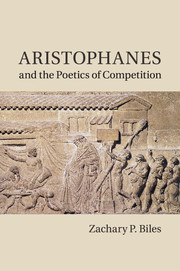Book contents
- Frontmatter
- Contents
- Acknowledgments
- List of abbreviations
- Introduction: proagon
- 1 From Thamyris to Aristophanes: the competitive poetics of the comic parabasis
- 2 The competitive partnership of Aristophanes and Dikaiopolis in Acharnians
- 3 Aristophanes' poetic tropaion: competitive didaskalia and contest records in Knights
- 4 Intertextual biography in the rivalry of Cratinus and Aristophanes
- 5 Aristophanes' Clouds-palinode
- 6 Dionysos and Dionysia in Frogs
- Bibliography
- General index
- Index of passages
6 - Dionysos and Dionysia in Frogs
Published online by Cambridge University Press: 25 January 2011
- Frontmatter
- Contents
- Acknowledgments
- List of abbreviations
- Introduction: proagon
- 1 From Thamyris to Aristophanes: the competitive poetics of the comic parabasis
- 2 The competitive partnership of Aristophanes and Dikaiopolis in Acharnians
- 3 Aristophanes' poetic tropaion: competitive didaskalia and contest records in Knights
- 4 Intertextual biography in the rivalry of Cratinus and Aristophanes
- 5 Aristophanes' Clouds-palinode
- 6 Dionysos and Dionysia in Frogs
- Bibliography
- General index
- Index of passages
Summary
In previous chapters, I have attempted to identify the mark the poetic agon left on Aristophanes' comedies, not only by examining stray remarks that directly invoke this feature of Athenian dramatic performance, but by identifying themes deeply woven into the poetic fabric of the plays that resonate with their competitive background. This relationship is made more explicit in Frogs, in which an actual poetic contest forms the culminating sequence of events on which the outcome hinges. Performed at the Lenaia of 405, Frogs responds to the general state of crisis in which Athens found itself. The war against Sparta and her allies was going badly, for Athens' dwindling resources were impeding its ability to carry out military objectives. Adding gloom was the literary crisis that befell the city with the deaths first of Euripides and then of Sophocles. Although their degree of competitive success was very different, both men had been fixtures of the dramatic festivals for half a century. In an effort to articulate the significance of the “desperate” cultural situation occasioned by their deaths, in the first half of Frogs Aristophanes has the god of the Theater himself, Dionysos, attempt to save Athenian tragedy by descending to Hades to rescue Euripides. In the second half of the play, a change of plan is forced upon the god, who no sooner arrives in Hades than his services are required to decide whether Aeschylus or Euripides is the better poet.
- Type
- Chapter
- Information
- Aristophanes and the Poetics of Competition , pp. 211 - 256Publisher: Cambridge University PressPrint publication year: 2011

